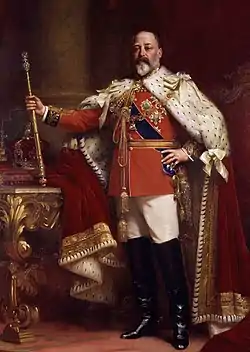Ceremonial dress
Ceremonial dress is clothing worn for very special occasions, such as coronations, graduations, parades, religious rites, trials and other important events. In the western dress code hierarchy of dress codes, ceremonial dress is often considered one of the most formal, in other cultures ceremonial dresses vary widely having entirely different meanings, and styles.

State portrait of King Edward VII of the United Kingdom, showing the coronation regalia atop a full dress military uniform
| Part of a series on |
| Western dress codes and corresponding attires |
|---|
|
Legend:
|
Examples
There has been documented knowledge on the effects of ceremonial clothing, with those wearing ceremonial clothing have been used to denote a wide range of usage among varying unique cultures.[1] Examples of ceremonial dress include:
- royal cloak (ermine lined), crown and scepter of a monarch
- court dress, such as the robe and wig worn by British judges
- diplomatic uniform
- the full dress uniforms of military personnel (or ceremonial suit of armour)
- religious clothing, such as liturgical vestments
- folk costume or tribal reserved for the most formal occasions
- academic dress
- Wedding clothing, including wedding dresses
See also
References
- Driscoll-Engelstad, Bernadette (2005). "Dance of the Loon: Symbolism and Continuity in Copper Inuit Ceremonial Clothing" (PDF). Arctic Anthropology. 42 (1): 33–46. doi:10.1353/arc.2011.0010. JSTOR 40316636. S2CID 162200500.
This article is issued from Wikipedia. The text is licensed under Creative Commons - Attribution - Sharealike. Additional terms may apply for the media files.